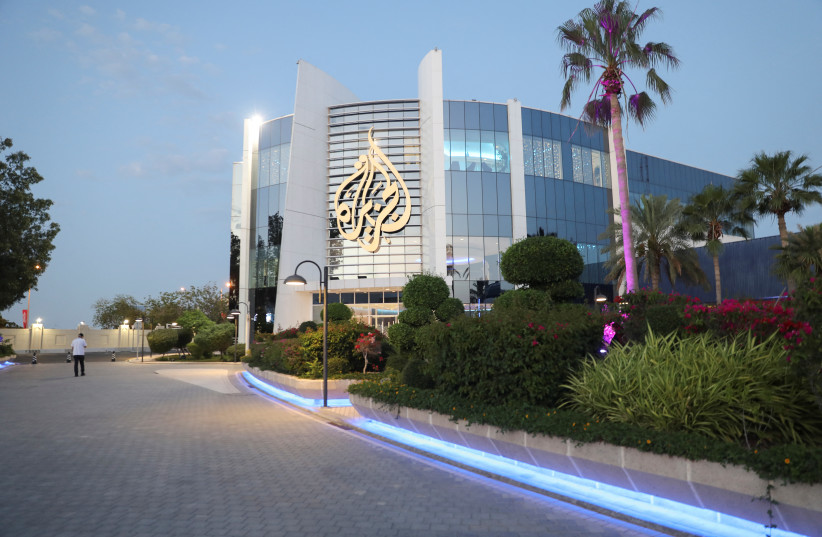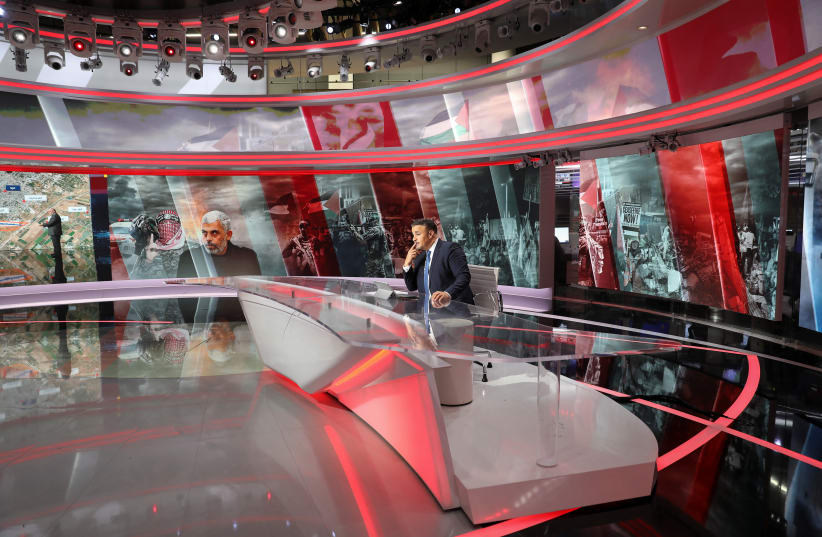Walid Omary, Al Jazeera’s Jerusalem bureau chief, confirmed in a conversation with The Media Line that Israeli police arrived Sunday at a hotel where the network’s English-speaking correspondents would have broadcasted from and confiscated broadcast equipment, closing off access to the room.
“This is a very big mistake,” said Omary. “There are no security reasons; there are internal political reasons for this within Israel. Israel can no longer say it shares Western values and respects those values of democracy, liberalism, human rights, freedom of press and expression.”
Israel’s government ordered the local offices of Qatar’s Al Jazeera satellite news network to close on Sunday, bringing a long-standing dispute between the two to a climax. For years, Israel has voiced its dissatisfaction with the Qatari network, blaming it for incitement.
Since the eruption of the war between Hamas and Israel this past October, the Israeli government has repeatedly threatened to shut down the network’s operations in the country. On Sunday, the Israeli cabinet approved the decision.
For more stories from The Media Line go to themedialine.org.
“Al Jazeera correspondents have harmed the security of Israel and incited against IDF soldiers. The time has come to eject Hamas's mouthpiece from our country,” said Israeli Prime Minister Benjamin Netanyahu after the decision had been made.


The measure will be in place for 45 days and can then be renewed.
The move is believed to be the first time Israel has shut down a foreign news outlet. The channel’s various outlets are now blocked from being viewed in Israel; its website is inaccessible from the country.
The move came as Qatari-mediated negotiations for a deal between Hamas and Israel on the release of Israeli hostages and a cease-fire in Gaza entered a critical phase.
The main offices of Al Jazeera, located elsewhere in Jerusalem, were already shut down a while ago due to what Omary described as “long-time incitement” by members of Israel’s current far-right government. As a result of the recent government order, the network has stopped all work within Israel and is currently operating out of the West Bank territories under Palestinian Authority control.
A decision regarding the revocation of Al Jazeera journalists' press accreditation not made
According to Nitzan Chen, director of the Israeli Government Press Office, a decision regarding the revocation of Al Jazeera journalists’ press accreditation has yet to be made.
“The issue is subject to legal clarification,” Chen told The Media Line, refusing to answer any other questions on the sensitive matter that has sparked criticism of Israel.
The network has 16 staffers currently unable to work in Israel. Al Jazeera employees a total of 57 people in Israel, the West Bank and the Gaza Strip.
While Israel claims that the network poses a security risk to the country, it has not released any evidence to back this claim. Israeli media reported that the heads of the national security services voiced their reservation regarding the timing of the move, as it could negatively impact the truce talks currently being mediated by Qatar.
The station has differentiated itself from others in the Arab world, both by allowing for the expression of views contrasting those broadcast in state-run and closely censored Arab channels and by frequently interviewing Israelis—officials and others—whose voices were previously never heard in the Arab world.
Omary denies the Israeli government’s claims about Al Jazeera posing a threat to Israel’s security. Part of the cabinet deliberations on the order to shut down the network are sealed from public access, making some of Israel’s accusations difficult to prove or disprove.
“Al Jazeera glorifies Hamas and aids it by reporting on Israeli troop movements,” said David M. Weinberg, senior managing fellow at the Misgav Institute for National Security and Zionist Strategy. “It constantly seeks to drum up terrorism against Israelis during Ramadan, calling daily for West Bank Palestinians to rise up against Israel in sympathy with the Hamas in Gaza.”
According to Omary, “This is all a lie. We constantly broadcast everything from Israeli officials—from government spokespeople to Israeli military spokesmen. We are always ready to have Israeli officials come and express their points of view. We do not incite against Israel and have never violated the law, including military censorship. The government knows very well they have no real accusations against us, this is being done for political reasons,” he added.
Hours after the cabinet meeting, there were reports that the talks between Hamas and Israel had essentially collapsed and intense efforts by US officials were underway to salvage them.
“Israel is trying to pressure Qatar in order to reach a deal on the hostages—this is the major reason,” said Omary.
“It’s clear that Israel has delayed acting against Al Jazeera until now because of the role that Qatar was playing in the attempts to cut a hostage deal with Hamas,” Weinberg said. “Given the fact that the Qatari efforts seem to have failed, there is no longer any good reason to delay acting against Al Jazeera,” he reasoned.
Meanwhile, there has been no official announcement from any of the parties involved in the talks that they have ended in failure.
The move has been widely criticized both in Israel and internationally, coming under fire as a move that curtails the freedom of the press.
“This is a dark day for the media,” read a statement from the Foreign Press Association in Israel. “With this decision, Israel joins a dubious club of authoritarian governments to ban the station.”
The Association for Civil Rights in Israel (ACRI) has petitioned the Supreme Court, requesting to cancel the order.
“There is a wide variety of effective measures Israel has at its disposal in order to protect its national security from media outlets who are accused of incitement long before closing down a network,” said Hagar Shechter, a lawyer at ACRI who is a signatory to the appeal.
“The complete shutting down of a network is undemocratic and is reserved for dictatorships,” Shechter told The Media Line. “It may well be that Al Jazeera expresses a narrative that is uncomfortable for Israelis to hear, but during times of war, there is even greater importance to hear different narratives.”
Journalists from Israel sometimes rely on Al Jazeera for their reports on the Arab world. The network reports and stories are often quoted by Israeli media outlets, also as a window for Israelis to see and hear Arab sentiment on pressing issues, including the current war.
Earlier in the war, Israel shut down the Al Mayadeen network associated with the Lebanon-based Hizbullah terrorist organization, claiming that the network was causing “substantial harm to national security.”
Israel accuses the Qatari news channel of bias against it. Relations between Al Jazeera and Israel have always been tense but took a turn for the worse two years ago when a prominent journalist from the network, Palestinian-American Shireen Abu Akleh, was killed by Israeli soldiers in the West Bank, an incident the Israeli military later apologized for. During the current war, a cameraman for the network was killed by an Israeli airstrike, and several other staffers were wounded. Al Jazeera and other networks have accused Israel of deliberately targeting journalists, a claim Israel denies.
Not everyone is opposed to the move.
“This is long overdue,” Weinberg told The Media Line. “The network hosts the most antisemitic, anti-Western, radical Islamic preachers who poison the minds of millions against Israel and the West.”
Israel is not the first country to clash with Al Jazeera. In 2013, Egypt stopped the English broadcasting of the channel, accusing it of incitement and detaining several of its journalists. Iraq also closed the station that same year. In 2017, Saudi Arabia blocked the network’s website, claiming it was favoring Iran as a regional power.
“Israel should ask other dictatorships how well it worked out for them when they banned Al Jazeera,” said Omary.
Throughout the years, several US officials have also criticized the network for having an anti-US bias, but no major move has ever been taken against it.
